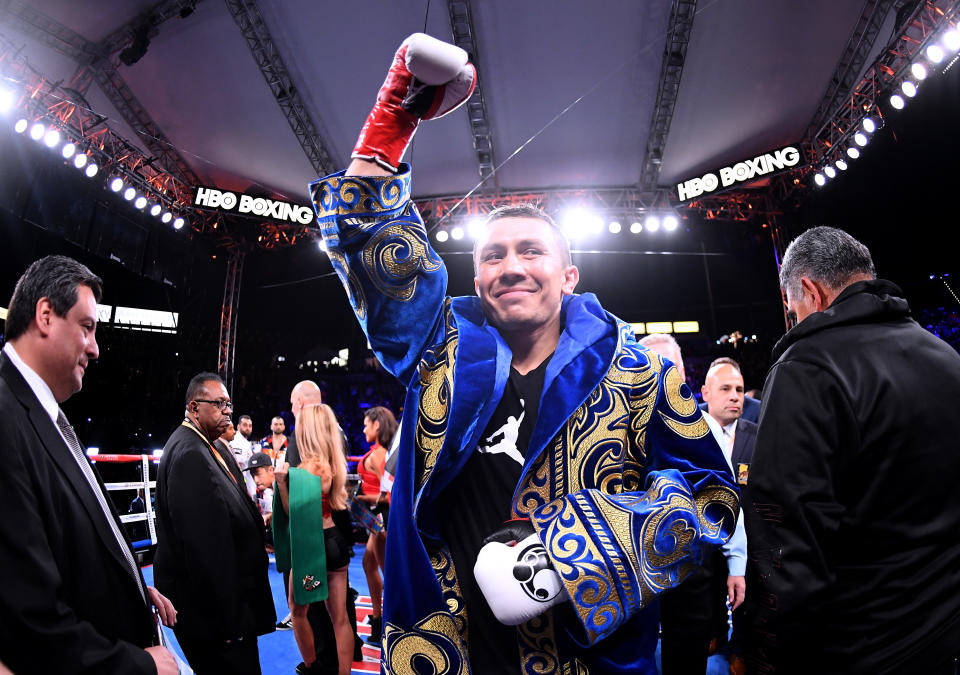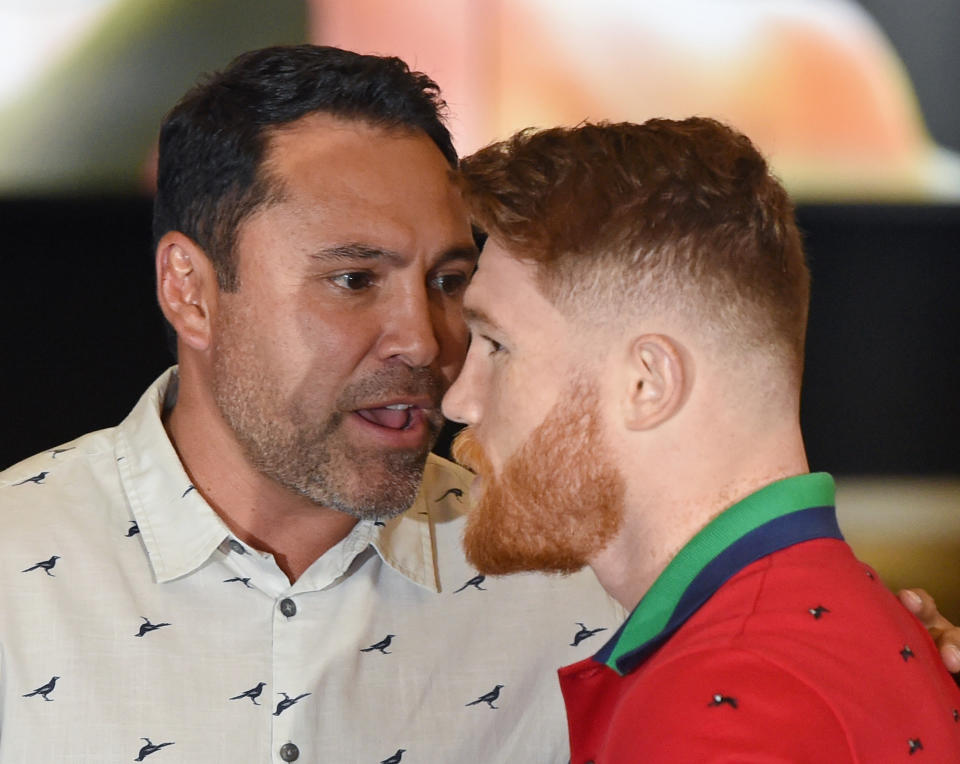By not giving in to Oscar De La Hoya and Canelo Alvarez, GGG controlled rematch talks all along

For most of his career, Gennady Golovkin has been cautious about what he’s said in the media. He’s routinely been respectful and has made his opponents sound like a mixture of Marvelous Marvin Hagler, Carlos Monzon and Harry Greb. He’s always been cheerful and sunny, and avoided saying anything even remotely close to controversial.
But in his first remarks after news that Canelo Alvarez had twice failed anti-doping tests in February, Golovkin was unusually blunt, his words shockingly forceful. He scoffed at Alvarez’s claim that his positive tests for Clenbuterol were as a result of eating tainted meat.
He said he could see injection marks on Alvarez’s arms in photos he examined. He accused the Nevada Athletic Commission of coddling Alvarez and said the boxing business is corrupt.
It was jaw-dropping stuff, not only because of what was said but who it was that said it. And he never let up. After Alvarez was forced to withdraw from their planned May 5 rematch in Las Vegas because of the drug-test failures, Golovkin fought Vanes Martirosyan instead. Two days before that fight, he put the odds of an eventual rematch with Alvarez at 10 percent during an interview with Yahoo Sports.
On Thursday, well after a Golden Boy Promotions-imposed noon PST deadline, Golovkin agreed to an offer and the rematch so many had been so looking forward to before the positive drug tests was back on. Golovkin and Alvarez will meet for the WBA and WBC middleweight belts in a pay-per-view bout on Sept. 15 at T-Mobile Arena in Las Vegas.
To the casual observer, it may seem as if Golovkin lost and caved in. That is hardly the truth, however. Golovkin is the huge winner in this sordid mess and comes out of this in a better position than he was previously.
It’s ludicrous that anyone could tag this as a negotiating defeat for Golovkin. In their first bout, which ended in a draw on Sept. 16, 2017, Alvarez had a 70-30 advantage in the revenue split. When the rematch was negotiated for May 5, it was 65-35.
But when that fell apart because of Alvarez’s drug test failures, Golovkin shifted and demanded purse parity. He wanted a 50-50 split. And while Alvarez has long been one of boxing’s stars, Golovkin’s demand was not without merit.
Their first fight sold 1.4 million on pay-per-view when including the online sales. The second fight figures to do 1.6 or 1.7 million.

Golden Boy Promotions CEO Oscar De La Hoya, who basically spent his time negotiating the fight on Twitter, said he would turn to Daniel Jacobs as an opponent on Sept. 15 for Alvarez if Golovkin didn’t take his offer.
Most industry experts believe an Alvarez-Jacobs fight would be lucky to hit 500,000 and would probably have come in closer to 400,000. And though De La Hoya was threatening to have Alvarez fight Jacobs, that was never a possibility. Sources close to Jacobs confirmed to Yahoo Sports that Golden Boy’s offer to him was a very lowball one and was dismissed out of hand.
It wasn’t, one person said, even worth discussing.
Golovkin stuck to his guns and Golden Boy kept raising the offer. On Tuesday, Golden Boy offered 40 percent of the revenue with a 2.5 percent bonus to Golovkin if he won. Golovkin said no. Eventually, Golden Boy raised it to 42.5 percent, win, lose or draw.
By this point, Golovkin had said that in an attempt to compromise, he’d take 45 percent instead of a 50-50 split. Golden Boy was having none of it, and De La Hoya put a noon Wednesday deadline on the 57.5-42.5 deal.
Noon came and went and Golovkin declined. Though he was being pressured from many angles to say yes, and he’d be realizing a 12.5 percent increase from what he’d made in the first bout, he wasn’t fixated on the money.
In a May 3 interview with Yahoo Sports, the normally easygoing Golovkin interrupted a question about the purse split during an interview with Yahoo Sports.
“Money, it’s good, you know?” Golovkin said. “But it’s not all about the money. It’s about what is right and what is not right. There is more to life than just [money].”
When things got dicey at the end of the talks with Alvarez, Golovkin stuck to his principals. He said no to 42.5 percent, even when it looked as if he’d have to fight WBO champion Billy Joe Saunders for about a tenth of what he’d have made to face Alvarez.
After the deadline passed, something happened. The two sides agreed they would not disclose the final revenue split, but it is plainly obvious Golovkin got the 45 percent he was holding out for. Golden Boy had nowhere else to go and he knew it.
He wound up getting himself 50 percent more than he had in the first bout, going from 30 percent of the revenue to 45 percent. He knows Alvarez will be very carefully drug-tested given his previously failures that have never been properly explained.
This was a huge win for Golovkin, though he’s the kind of guy who wants his victories to come as a result of the concussive power in his fists.
The only way he could do better on Sept. 15, though, is if he knocks Alvarez cold. That’s because that is exactly what he did to De La Hoya and Co. in the negotiations.
More from Yahoo Sports:
• World Cup: Russian lawmaker discourages sex with foreigners
• ’He quit’: LeBron James gets ripped by ex-NBAer Stephen Jackson
• Hall of Fame coach, women’s basketball icon Anne Donovan dies at 56
• Maryland OL dies days after post-workout hospitalization


